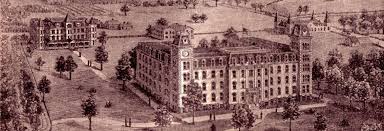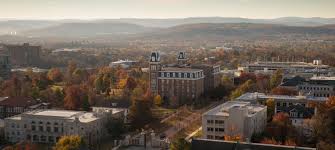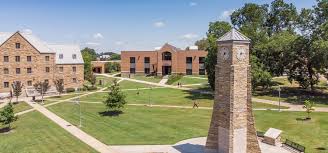
University of Arkansas
When you think of American universities that balance tradition, academics, athletics, and culture, the University of Arkansas easily stands out. Nestled in the beautiful Ozark Mountains in Lafayette, this public research university has become an icon of the South and the pride of the state. Known as the home of the Razorbacks, the University of Arkansas combines academic rigour with school spirit in a way that is both unique and inspiring.
With a history stretching back to 1871, the university has played a pivotal role in shaping education, research, and community development in Arkansas and beyond. But beyond the numbers and statistics, the University of Arkansas is about identity, belonging, and growth. For students, it offers more than a degree—it offers a culture of excellence, resilience, and community engagement.
This article explores everything you need to know about the University of Arkansas, from its history, academics, and athletics to student life, notable alumni, and future vision.
Introduction
Why the University of Arkansas Matters
The University of Arkansas matters not only to the state but also nationally. As the flagship university of Arkansas, it serves as a beacon of higher education and research. It plays an essential role in producing leaders, innovators, and professionals who contribute across industries—whether in politics, business, sports, or science.
The university is also a cultural hub. Its athletic identity through the Razorbacks has become a unifying symbol for the state. On Saturdays in the fall, fans from all over gather in Lafayette or tune in to cheer on the Hogs, making it a statewide phenomenon.
In academics, the institution is known for strong programs in business, engineering, agriculture, and architecture. Its research contributions also extend into technology and sustainability, positioning it as a driver of economic and social progress in the South.
Simply put, the University of Arkansas is not just a school—it’s a symbol of Arkansas pride and ambition.
A Brief Overview of Location and Legacy
The University of Arkansas is located in Lafayette, Arkansas, a vibrant college town consistently ranked among the best places to live in the United States. With a population of around 95,000, Lafayette offers the perfect blend of small-town charm and metropolitan energy.
The university’s legacy lies not only in academics but also in community integration. Over its 150+ years, it has grown from a modest institution into a research powerhouse with over 30,000 students. The Old Main building, the oldest structure on campus, stands as a powerful symbol of both tradition and progress.

Historical Background
Founding in 1871 and Early Growth
The University of Arkansas was founded in 1871, a critical period in American history when the South was rebuilding after the Civil War. Its creation marked a commitment to providing higher education opportunities to Arkansans, something that was rare at the time.
The university’s land was chosen on the site of a former farm overlooking the Ozarks, setting the stage for what would become one of the most scenic campuses in the nation. Its original name was the Arkansas Industrial University, and the focus was on practical education—agriculture, mechanics, and the sciences—reflecting the economic needs of the state.
From the very start, the university was about progress and opportunity, offering education to a diverse group of students and laying the groundwork for its future expansion.
The Evolution of the University Over Decades
Over the decades, the University of Arkansas grew in both size and reputation. The early 20th century saw expansions in academic programs, the construction of landmark buildings, and a rise in student enrolment.
The Great Depression and World War II tested the institution, but it persevered. Post-war growth, fuelled by the GI Bill, brought thousands of new students and led to rapid expansion.
By the 1960s and 70s, the university had become a central player in research and higher education in the South. It also embraced social change, playing a role in the desegregation of higher education, marking a turning point in Arkansas’ history.
Today, it stands as a Tier 1 research institution, with a balance of historical charm and modern innovation.
Key Moments in Arkansas’ History
Several moments stand out in the university’s history:
- 1871 – Founding as Arkansas Industrial University.
- 1875 – Construction of Old Main, the iconic symbol of the university.
- 1948 – The admission of Silas Hunt, the first African American student at a major Southern public university.
- 2003 – The Walton Family Foundation’s landmark $300 million gift, the largest ever given to a public university at the time.
Each milestone reflects the University of Arkansas’ role not just as an academic institution but as a social and cultural leader in the South.
Campus and Facilities
The Iconic Old Main and Its Symbolism
No discussion of the University of Arkansas is complete without mentioning Old Main. Built in the late 19th century, Old Main is the university’s oldest building and a lasting symbol of its history and resilience. Its twin towers are instantly recognisable and have become synonymous with the university itself.
Old Main is more than just a building—it represents tradition, endurance, and pride. Generations of students have walked through its halls, and it remains the centerpiece of the campus. Today, it houses classrooms and offices, but its greatest value is symbolic: it ties the modern university to its historical roots.
Modern Infrastructure and Student Facilities
Beyond Old Main, the University of Arkansas boasts a modern campus that supports student growth and innovation. The university has invested heavily in facilities to ensure it remains competitive in academics and research.
State-of-the-art engineering labs, business buildings, libraries, and technology centres give students access to resources that prepare them for careers in an increasingly digital world. The Student Success Enter, health facilities, and recreation centres also ensure a balance between academics and student well-being.

Libraries, Labs, and Research Centers
The University Libraries, particularly Mullins Library, serve as the intellectual hub of the campus. With millions of volumes, digital resources, and research databases, it provides students with the academic backbone they need.
Specialized research centers, such as those in nanotechnology, agriculture, and business innovation, reflect the university’s status as a Carnegie R1 Research Institution. These centers not only contribute to global knowledge but also directly impact Arkansas’ industries and economy.
Academic Excellence
Colleges and Schools Within the University
The University of Arkansas is home to ten colleges and schools, including:
- The Sam M. Walton College of Business
- The College of Engineering
- The Dale Bumpers College of Agricultural, Food and Life Sciences
- The Fay Jones School of Architecture and Design
- The Fulbright College of Arts and Sciences
Each college brings unique strengths, producing graduates who excel nationally and internationally.
Popular Majors and Programs
The university offers over 200 academic programs, but certain majors stand out:
- Business and Finance (Walton College is nationally ranked)
- Engineering (particularly mechanical, electrical, and civil)
- Agriculture and Food Sciences
- Architecture and Design
- Journalism and Communications
These programs attract not just in-state students but also thousands from across the U.S. and around the world.
Research and Innovation at Arkansas
Research is a cornerstone of the University of Arkansas. Its classification as an R1: Doctoral University – Very High Research Activity places it among the top research institutions in the country.
From sustainable agriculture and nanotechnology to supply chain management and artificial intelligence, Arkansas researchers push boundaries. Collaborations with global corporations and government agencies ensure that their work has real-world applications, enhancing the university’s reputation.
Athletics and the Razorback Spirit
The Legacy of the Razorbacks Football Program
When people hear “University of Arkansas,” many instantly think of the Razorbacks. The football program, founded in 1894, is the heartbeat of the university and a source of statewide pride. Known affectionately as the Hogs, the Razorbacks represent grit, resilience, and passion.
The program’s golden years in the 1960s, under legendary coach Frank Broyles, established Arkansas as a national powerhouse. The 1964 National Championship remains one of the proudest moments in the school’s history. Over the decades, Arkansas football has produced NFL stars, unforgettable bowl games, and countless Saturdays filled with tailgates and cheers.
What sets Razorback football apart is the statewide identity. Arkansas has no professional sports teams, so the Razorbacks are the team for the entire state. From Little Rock to Fayetteville, from rural towns to bustling cities, Arkansans unite behind the Hogs every fall.
Every home game at Donald W. Reynolds Razorback Stadium is a spectacle—over 76,000 fans filling the stands, the marching band playing “Arkansas Fight,” and the iconic “Woo Pig Sooie” chant echoing across the Ozarks. It’s more than just football; it’s a cultural ritual that binds the Arkansas community together.

Other Sports and NCAA Achievements
While football may steal the headlines, Arkansas excels across athletics. The university has a proud history of success in track and field, where legendary coach John McDonnell built one of the most dominant programs in NCAA history. Between indoor and outdoor track, Arkansas has won over 40 national championships, cementing its status as a track powerhouse.
Arkansas also competes strongly in:
- Basketball – The men’s basketball program won the 1994 NCAA Championship under coach Nolan Richardson and remains a competitive force in the SEC.
- Baseball – The Razorbacks baseball program regularly contends for the College World Series, drawing huge fan support to Baum-Walker Stadium.
- Gymnastics, softball, and soccer – These programs continue to grow, adding to Arkansas’ NCAA reputation.
Athletics at Arkansas aren’t just about wins and losses—they’re about building school identity, student pride, and alumni connections that last a lifetime.
The Role of Athletics in Campus Identity
At the University of Arkansas, athletics are deeply tied to campus culture. Whether you’re a student-athlete, a marching band member, or just a fan in the stands, the Razorback identity connects everyone.
Athletics also serve as a recruitment tool, attracting students nationwide who want to experience SEC-level sports. For many, the chance to cheer on the Razorbacks at a packed stadium or arena is a deciding factor in choosing Arkansas over another school.
Sports unify the campus in ways academics alone can’t. Victories bring celebrations across Fayetteville, while losses spark passionate debates in classrooms, dining halls, and local bars. In short, athletics are woven into the very DNA of the University of Arkansas.
Admission Process and Requirements
Undergraduate Admission Criteria
Getting into the University of Arkansas is competitive but accessible, especially for in-state students. Admission decisions are based on a combination of GPA, standardized test scores (ACT or SAT), and high school coursework.
Generally:
- A GPA of 3.2 or higher gives students a strong chance.
- ACT scores around 23–28 or SAT scores of 1150–1300 are competitive.
- The university also offers test-optional admissions, placing more emphasis on academic performance and extracurriculars.
Beyond numbers, the admissions office looks for students who demonstrate leadership, community involvement, and academic curiosity. Essays and recommendation letters can strengthen applications, especially for competitive programs like business or engineering.
Graduate and International Admissions
Graduate admissions vary by program but typically require:
- A strong undergraduate GPA (usually 3.0+)
- GRE/GMAT scores for certain programs
- Statement of purpose, research interests, and recommendation letters
International students are a growing part of the Arkansas community, with applicants from over 120 countries. English proficiency tests (TOEFL, IELTS) are required for non-native speakers. The university also provides strong support services for international students, helping them adapt to life in Fayetteville.

Scholarships and Financial Aid
One of the university’s biggest strengths is its commitment to affordability. Arkansas offers numerous scholarships, including:
- Chancellor’s and Merit Scholarships for high-achieving students
- Need-based financial aid packages
- Out-of-state tuition waivers, making it more affordable for non-Arkansans
The Walton Family Foundation, tied to Walmart’s roots in Arkansas, has also provided significant funding for scholarships, particularly in the business school. This financial support helps the university remain competitive and accessible to students from all backgrounds.
Housing and Campus Living
On-Campus Housing Options
First-year students are strongly encouraged to live on campus, and the university provides a wide range of residence halls. Options include:
- Traditional dorms for those who want the classic college experience
- Suite-style housing with shared common areas
- Living-learning communities (LLCs) that group students by major or interest
Living on campus fosters community spirit, makes it easier to meet new friends, and keeps students connected to the heartbeat of Razorback life.
Off-Campus Living in Fayetteville
For upperclassmen and graduate students, off-campus housing is popular. Fayetteville offers apartments, townhomes, and rental houses within walking or biking distance of campus.
The city’s college-town vibe means landlords cater heavily to students, with affordable options and plenty of amenities. Public transportation, bike paths, and university shuttles also make commuting easy.
Dining Services and Campus Food Culture
Campus dining has come a long way from the old cafeteria days. The university offers multiple dining halls, food courts, and coffee shops. Meal plans are flexible, and options range from traditional Southern cooking to international cuisine.
Local Fayetteville food culture also bleeds into student life. Students love exploring Dickson Street restaurants, local coffee shops, and food trucks. From BBQ to vegan-friendly eateries, Fayetteville’s food scene is a big part of the student living experience.

Fayetteville – The University Town
The City of Fayetteville and Its Charm
Fayetteville consistently ranks as one of the top college towns in America. With its location in the Ozark Mountains, it combines natural beauty with cultural vibrancy. The town is safe, welcoming, and tailor-made for students.
The mix of small-town warmth and big-city amenities makes Fayetteville special. Students enjoy hiking, biking, and outdoor adventures in the Ozarks while also having access to concerts, nightlife, and cultural events.
Local Culture, Food, and Entertainment
Fayetteville’s heartbeat is Dickson Street, the entertainment hub lined with restaurants, bars, theaters, and music venues. On weekends, it’s packed with students and locals enjoying live bands, craft breweries, and Razorback celebrations.
The city also embraces art and culture. The Walton Arts Center hosts Broadway shows, concerts, and art exhibits. The Fayetteville Farmers Market, held on the historic square, adds a community vibe with local produce, crafts, and live music.
Student Integration into the Community
The University of Arkansas isn’t isolated from its town—it’s deeply integrated. Students volunteer with local nonprofits, intern with Fayetteville businesses, and participate in community events. The university also works closely with local government to ensure Fayetteville remains student-friendly.
This integration creates a symbiotic relationship: the city benefits from student energy, and students gain real-world experiences in a supportive environment.
Notable Alumni and Achievements
Political Leaders and Public Figures
The University of Arkansas has produced governors, senators, and even a U.S. president. Most notably, Bill Clinton, the 42nd President of the United States, taught law at the university, while Hillary Clinton was also connected to the law school.
Arkansas alumni also include governors like Asa Hutchinson and senators such as J. William Fulbright, whose name graces the Fulbright College of Arts and Sciences and the prestigious Fulbright Scholarships program.
Business Innovators and Entrepreneurs
Given the university’s proximity to Walmart’s headquarters in Bentonville, it’s no surprise that many business leaders emerged from the Sam M. Walton College of Business. Alumni include executives at Walmart, Tyson Foods, and J.B. Hunt, three Fortune 500 companies rooted in Arkansas.
Entrepreneurs in technology, logistics, and finance also credit their start to connections and education at the university.
Athletes and Celebrities
The Razorbacks have produced countless professional athletes. Notable names include:
- Jerry Jones, owner of the Dallas Cowboys and a former Arkansas football player
- Pat Summerall, legendary sports broadcaster and former NFL player
- Joe Johnson, NBA All-Star and Olympic gold medalist
Beyond sports, alumni include authors, musicians, and cultural figures who’ve carried the Arkansas spirit into diverse fields.


